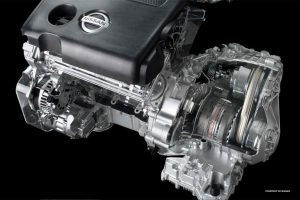There’s a lot to like about Nissan vehicles. They’re generally regarded as safe, reliable, and innovative. Most Nissan cars tend to be long-lasting, too. Unfortunately, the name “Nissan” also has a few negative connotations. Many auto enthusiasts are only too familiar with the brand’s history of CVT (continuously variable transmission) issues.
If you’re wondering about the latest news on Nissan CVTs and want to know if the brand has finally addressed the problem, keep reading.
Contents
Are Nissan CVTs Better Now?
First, let’s answer the titular question. We can’t say that Nissan has entirely fixed all of the CVT issues that have plagued owners in the past. However, we can say the company is aware of those issues – it had to face several lawsuits, after all – and has taken steps to address them. If you buy a brand-new Nissan nowadays, you shouldn’t have to worry quite as much as you once did.
Of course, that doesn’t mean that you shouldn’t worry at all. Nissan is still putting its faith in CVT technology, as opposed to any alternatives. Many of the latest Nissan models come with these kinds of transmissions. The Juke. The Kicks. The Altima. The Almera. The Rogue. The Pathfinder. They’re all equipped with CVT systems, and they’re not the only ones.
By nature, CVT systems will always be prone to certain problems and failures. They regularly overheat, slip, hesitate, or cause the car to shudder or lose power. That’s not just limited to Nissans. It’s CVT technology in general. Plus, these kinds of transmissions are costlier to fix than conventional transmissions, and don’t tend to last as long. In short, they’ve got a lot of issues.
What Has Nissan Done to Fix the Issue?
As you can see, CVT transmissions aren’t exactly the best. But Nissan is still plowing on with them, regardless. Even after facing some serious legal trouble and a lot of unhappy customers, the company has maintained its faith in CVT technology. Fortunately, it – or more specifically, its partner company, Jatco – has also made a few changes along the way:
- Installing additional transmission cooling components to counteract the overheating issue which was reported in many older Nissans.
- Fitting new assemblies and valve bodies in an attempt to make the CVT system more efficient and less prone to failure.
- Reprogramming the transmission control unit (TCU) in order to reduce the risk of the CVT belt slipping.
- Switching from the old belts made of stamped steel plates to stronger steel chains that are theoretically less likely to fail.
New and improved CVTs are present on the latest Nissan releases. Models like the Rogue, for example, now come with the redesigned CVT system. Thanks to this, it should, in theory at least, be less likely to fail. However, since the redesigns are still quite recent, we can’t say for sure that Nissan has truly solved its CVT issues.
Reports of CVT problems in these vehicles certainly seem to be decreasing. Many owners have no trouble with their transmissions at all. However, that doesn’t mean that the problems have been erased entirely. It will take time to truly see how efficient and safe these new CVTs are, and anyone considering investing in a new Nissan needs to take that into account.
Which Nissan Cars Have CVT Problems?
A lot of them. Nissan has been using CVTs for quite some time now, and it uses them extensively across its vehicle lineup. Some of the models impacted by CVT issues over the last two decades (going back to around 2004, to be precise) include the following:
- Altima
- Juke
- Maxima
- Murano
- Pathfinder
- Quest
- Rogue
- Sentra
- Versa
- Versa Note
This shows just how widespread the issues have been. A lot of models have been affected, and many Nissan owners have had to deal with the hassle of having their CVT systems fixed. Fortunately, Nissan also ended up extending the warranties on a lot of these vehicles, protecting users against costly CVT repair bills.
In terms of which models or years are most at risk, there isn’t one that stands out ahead of the rest. They’ve all had problems at one stage or another, and units produced between 2003 and 2017 tend to be the worst affected. If you’re thinking of a new Nissan, that won’t impact your decision. But if you want to buy a used one, it’s something to think about.
The Signs and Issues of a Faulty CVT
If get yourself a new Nissan – or already own one – you’ll want to know what to expect and watch out for. Here are some of the most common signs and symptoms that tend to appear when the CVT has a problem.
Loss of Power
We’ll begin with arguably the worst problem of the bunch: loss of power. In older Nissans, this was a prevalent issue. Users could be driving along as normal when suddenly experiencing a sudden loss of power in their vehicles. This can lead to unexpected stalls or sudden drops of speed, usually due to the transmission getting too hot.
Shuddering
A common issue that has been reported repeatedly with Nissan CVTs is shuddering or shaking. This is just what it sounds like – you feel the car shake and shudder around you. Usually, this happens when the car is driving at a relatively low speed, or while pulling away from a stop. It’s uncomfortable and also often disconcerting for drivers and passengers alike.
Burning Smells
One of the main problems with CVT systems is that they get extremely hot. A particular issue with older Nissan CVTs is that they didn’t have much in terms of cooling technology to ease those extreme temperatures. When the CVT overheats, therefore, components and transmission fluid start to emit a burning smell. This is less likely on modern Nissan CVTs, thanks to their advanced cooling features.
Weird Sounds
Owners may also notice unusual sounds because of their Nissan CVTs. Whining. Grinding. Clunking. All of which are a sign that something is wrong under the hood. They can have a range of causes, like slipped belts and damaged bearings. Either way, weird sounds are never a good sign, and it’s best to get your CVT checked out if you hear them.
Hesitation
You may also experience hesitation if your Nissan CVT is in need of a fix. Hesitation is basically when there’s a short delay as you shift form park into drive or reverse, for example. It’s almost like the car is “hesitating” before deciding to start moving. This is a frustrating fault to deal with, and another common occurrence among CVT systems in general.
Modern Nissan CVTs Should Be Better Than Before
Here’s the takeaway – Nissan has certainly acknowledged that there were issues with its CVT systems in the past. It’s made some changes, and theoretically, those changes should lead to better and more consistent transmission performance. We don’t have enough data to answer the question categorically, but buyers should feel more confident purchasing a brand-new Nissan compared to an older model.


